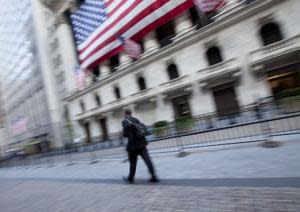 The Lookout
The LookoutDowngrade reverberates from Wall St. to Washington

The downgrade by ratings agency Standard & Poor's of the United States' credit is already having dramatic economic effects from Wall Street to Washington--and beyond.
With investors spooked by the move--as well as by the weak national and global economy, and by Europe's debt crisis--stocks continued to decline sharply in early trading Monday, even after last week's massive slide. Earlier today, European and Asian markets saw similar losses.
Still, some analysts said they didn't expect that the downgrade--which lowered the U.S. rating from AAA to AA+, would raise U.S. borrowing costs much. "The downgrade of U.S. sovereign credit by S&P on Friday reflects facts that have been well known to the market for some time," said Blackrock, the world's largest asset management firm, in a statement Monday. "So, it does not imply a fundamental increase in risk, and we don't believe that investors should change their behavior based solely on the downgrade."
But on Capitol Hill, lawmakers of both parties suggested over the weekend that the ratings downgrade may spur the bipartisan debt commission, created as part of the recent debt ceiling deal, to cut even more than the $1.5 trillion for which it has a mandate.
The S&P report created "a sense of urgency for the two parties to come together,"said Rep. Steve Southerland II, a Florida Republican, in comments echoed by others.
The report, released Friday afternoon, S&P said its action was driven by concerns over the deficit and skepticism about the ability of the political parties to agree on significant deficit reduction measures. In the repot, S&P analysts said they hoped to see the budget gap cut by a total of $4 trillion over the next decade, which includes the roughly $900 billion in cuts that will occur independent of the commission.
The report also suggested that the downgrade was prompted in part by S&P's belief that the Bush tax cuts, due to expire at the end of 2012, will stay in place, costing the government around $1.5 trillion in revenues over the next decade. "We have changed our assumption on this," wrote S&P, "because the majority of Republicans in Congress continue to resist any measure that would raise revenues, a position we believe Congress reinforced by passing the act."
In theory, the S&P's revenue assessment could raise pressure on the commission's Republicans to soften their opposition to tax increases. But so far, the GOP has successfully framed the deficit reduction initiative entirely as matter of cutting spending, with no tax hikes.
